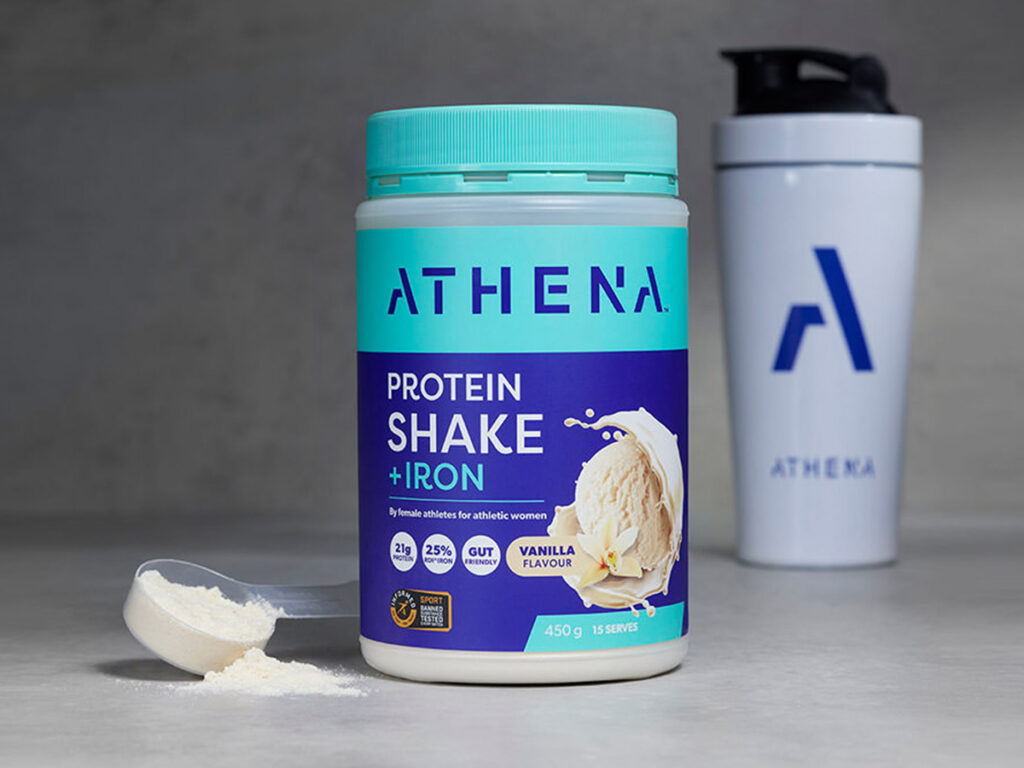1 in 3 Aussies are iron deficient… are you?
You’re tired, exhausted and getting sick a lot… is this flu season, or is it a sign of something deeper – like iron deficiency? Especially with the rise of plant based eating, which limits the intake of iron rich red meat, you may be suffering something worse than just the winter flu. To investigate further, we sat down to chat with Athena Sports Nutrition consultant and Advanced Sports Dietitian, Sally Walker, and one of our favourite Netball stars and Athena ambassador Kim Ravaillion, so you can know for sure whether you’re iron deficient.. Or not.
Before we dive in, an overview:
- In general, 38% of Australian females aged 19-30 aren’t reaching their daily iron requirements (insufficient level, not deficient level), as noted by the ABS.
- 15-35% of female athletes are iron deficient (versus 3-10% of male athletes), with menstruation the biggest contributing factor for iron losses.
- Females in the general population aged 18-50 need 18mg/day – double the iron requirement of men. Its likely female athletes need an additional 3 to 4 mg per day to replenish exercise related loses too.
- Another contributing factor is fluctuations in hormones like oestrogen and progesterone, which can impact a female’s ability to absorb iron.
Signs of low iron levels
● Constant fatigue that wont pass even after rest from training or eating more food.
● A weak immune system
● Looking pale
● Feeling lifeless, especially when you are training, and being unable to reach your peak

Kim Ravaillion’s story
‘Early on in my career I thought I was invincible and pushed myself to the limit from a training perspective – training twice a day. At the end of training sessions I would be exhausted and my body couldn’t keep up. Combined with not eating the right nutrition I ended up with an iron deficiency and required three infusions to stay on top of it. Since then I’ve educated myself with the help of nutrition experts, to read my own body when I’m feeling low. Now to manage my iron levels, I focus on my diet with plenty of iron rich foods, in addition to nutrition supplements such as Athena Protein Powder + Iron.’

Sally Walker’s story
I’ve worked with a female athlete in a weight category sport who would feel ok at the start of training but quickly ran out of steam for repeated efforts as training went on. We focused on energy availability to be gaining access to the right fuel at the right time and increasing sources of iron over the day from food sources and fortified foods to maximise nutrient density as part of a specifically managed energy budget. In doing this her capacity to train more consistently through the whole training right to the end improved significantly for better performance outcomes.
From my experience working with elite female athletes, they tend to have a super strong mindset and focus that can overtake messages from their bodies. They keep pushing through a majority of physical challenges and only usually discover issues such as iron deficiencies when something goes wrong, during assessments or when injured.
The one piece of advice I would give to both athletic women and elite female athletes is not to wait until you are defeated and lacking energy to start looking for answers. I encourage them to be proactive about including key iron sources to include in their diet to stay on top of essential needs and consider easy convenient ways to top up iron levels (like Athena Protein + Iron bars). Stay on top of your intake and if unsure and you want to understand your body better consider getting tested.
How can you improve your Iron intake?
● Increasing your consumption of iron rich food includes animal sources of food like red meat, chicken, fish and oysters and plant sources of foods including dark leafy greens, legumes, soy, wholegrains and some nuts and seeds. Try and include these food in main meals – but also include snacks over the day for a consistent intake.

● Iron absorption can be enhanced when these types of iron rich foods are eaten together or eaten with fruits and vegetables to provide vitamin C.
● Iron enriched protein shakes or protein bars – Athena offers both, allowing you to make the most of your post workout recovery

● Having regular serves of iron over the whole day can help reduce the strain put on the gut that some people experience with high dose iron supplements. Including fortified foods like and regular serves of iron in meals and snacks over the whole day can help to replenish iron as it is needed.
● Iron supplements can be helpful too – see your GP or accredited dietitian for guidance
Try the Athena Sports Nutrition range to help boost your iron levels!
For the full article grab the August/September 2024 issue of Women’s Fitness Australia from newsagents and convenience locations. Subscribe here.






